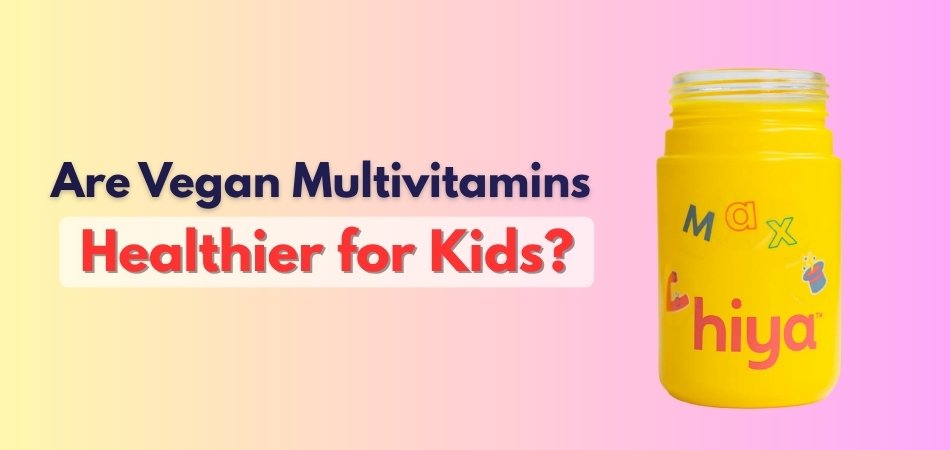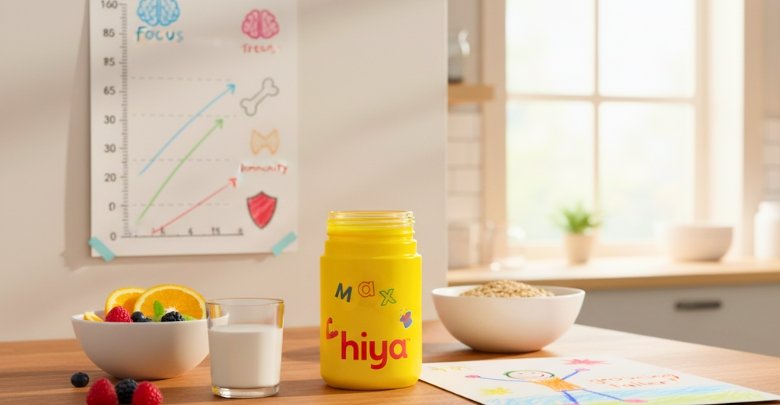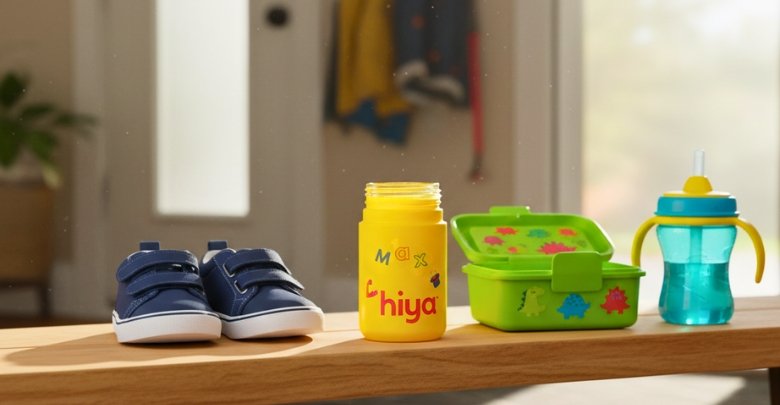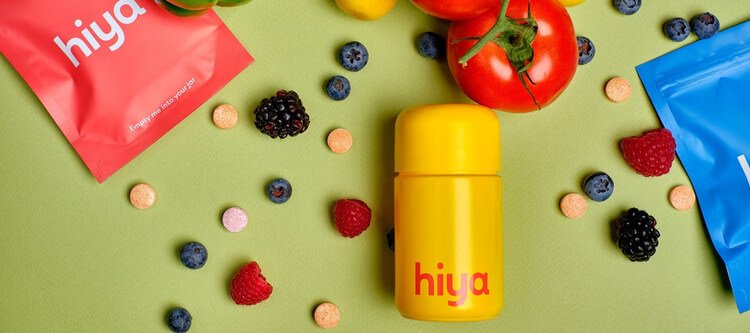The growing focus on healthier lifestyles has led many families to rethink the supplements they give their children. Vegan multivitamins are now gaining attention as a plant-based way to provide balanced nutrition without unnecessary additives. This shift isn’t just about trends — it’s about long-term wellness.
Are vegan multivitamins healthier for kids? In many ways, the answer leans toward yes. They replace animal-derived ingredients with clean, plant-based sources while delivering essentials like vitamin D3, B12, and iron. By doing so, they support growth, energy, and immunity in a way that feels both natural and reliable.
Deciding on the best supplement can still feel overwhelming, especially with so many options available. Keep reading to explore the research, comparisons, and practical insights that reveal why vegan multivitamins may be the right choice for your child.
Are Vegan Multivitamins Healthier for Kids?
Parents today are more thoughtful than ever about their children’s nutrition. With diets often falling short of essential vitamins and minerals, supplements are becoming a reliable solution. Vegan multivitamins, in particular, stand out because they use plant-based sources instead of animal-derived ingredients, appealing to families who value clean and safe health practices.
The growing shift toward plant-based living has created greater interest in these supplements. Parents want to know if vegan multivitamins are truly healthier for kids or just another trend. To answer this, we must first explore how multivitamins in general support children’s health and development. Here are the details:

Balanced Nutritional Support
Children rarely eat balanced meals every day. Multivitamins help fill nutritional gaps by supplying essential vitamins and minerals in consistent doses. For kids with selective eating habits, this ensures steady support for growth, brain function, and energy, even when diet alone does not meet their needs.
Allergen-free and Safer Ingredients
Many vegan options avoid common irritants like dairy, gelatin, and artificial coloring. By focusing on natural, plant-based sources, these supplements reduce the risk of allergies or sensitivities. This makes them particularly suitable for children who have dietary restrictions or parents who want to limit exposure to synthetic additives.
Boost to Growth and Immunity
Nutrients such as vitamin D, iron, and B12 are essential for strong bones, healthy blood, and better immunity. Vegan multivitamins often include these in bioavailable forms. Regular intake helps kids grow steadily and lowers the chances of deficiencies that might otherwise lead to fatigue, frequent illness, or slower development.
Consistency in Daily Health
Busy schedules and inconsistent eating habits make it difficult to guarantee children always get the right nutrition. Multivitamins provide a reliable foundation of essential nutrients every day. This consistency gives parents peace of mind while supporting their child’s long-term health, regardless of occasional lapses in diet quality.
Therefore, multivitamins — particularly vegan ones — can be an effective way to maintain steady growth, protect immunity, and provide balanced nutrition. Parents exploring plant-based options may also find insights from a Hiya review useful in understanding how these supplements compare in real life.
Understanding the Basics of Vegan Multivitamins
Vegan multivitamins are more than just supplements without animal ingredients; they represent a shift toward clean and conscious nutrition for children. Parents who want to ensure safety, quality, and ethical standards often lean toward vegan options, as these products deliver essential nutrients without compromising dietary values or health priorities.
Defining a Vegan Multivitamin
A vitamin is considered vegan when it avoids any animal-derived ingredients such as gelatin, fish oil, dairy, or shellac. Instead, plant-based materials like cellulose, algae, and fruit extracts are used. This makes vegan supplements suitable not only for vegan families but also for children with allergies or dietary restrictions.
Nutrients Typically Found in Vegan Formulas
These supplements often include critical nutrients like vitamin B12, vitamin D3 from lichen, calcium from algae, and iron from plant-based sources. They may also use fruit- and vegetable-derived blends to provide antioxidants and support overall wellness. This ensures kids get targeted support for growth and immunity.
Key Differences From Regular Multivitamins
Regular multivitamins may use animal-derived gelatin capsules, lanolin-based vitamin D, or fillers that don’t add nutritional value. Vegan alternatives, on the other hand, avoid these and focus on natural, allergy-friendly, and ethically sourced ingredients. The result is a cleaner supplement better aligned with modern family health concerns.
Vegan multivitamins stand apart because of their plant-based sourcing, allergen-conscious design, and focus on essential nutrients for children. With these basics in mind, the next step is to understand the key benefits they bring to kids’ growth and development.
Key Nutritional Benefits for Growing Children
Children’s growth demands a steady supply of vitamins and minerals, but everyday meals don’t always cover everything. Vegan multivitamins step in to fill those gaps, supporting development in ways that matter most. These benefits go beyond just “extra nutrition” — they directly affect how kids grow, think, and stay healthy.

Stronger Bones and Teeth
Calcium and vitamin D are essential for skeletal growth, yet many kids don’t get enough through diet alone. Vegan multivitamins often include lichen-based vitamin D3 and plant-based calcium, helping children build stronger bones and teeth during their most important growth years.
Enhanced Immune System
Vitamins like C, D, and zinc support immunity and reduce the frequency of colds or infections. Plant-based formulas often use fruit- and vegetable-derived nutrients, giving kids natural immune protection. This steady boost helps children stay active and miss fewer school days due to illness.
Better Cognitive Development
B vitamins, omega-3 fatty acids from algae, and iron all contribute to concentration, focus, and memory. These nutrients play a key role in brain development, ensuring children can learn effectively, process information faster, and perform better academically.
Increased Energy and Vitality
Iron, vitamin B12, and folate help form red blood cells and support energy production. Vegan multivitamins make these nutrients more accessible for children who may otherwise feel fatigued, giving them the stamina to keep up with studies, play, and physical growth.
Skin, Hair, and Overall Wellness
Nutrients like vitamin E, biotin, and antioxidants from plant-based ingredients promote healthy skin, stronger hair, and better cell repair. These vitamins also protect against oxidative stress, giving children a healthier appearance while strengthening their body’s natural defenses at the cellular level.
In short, vegan multivitamins don’t just fill dietary gaps — they support every major stage of a child’s development, showing why many kids need supplements to maintain strong health. Next, we’ll compare how these benefits stack up against non-vegan options.
Comparing Vegan and Non-vegan Options
When parents consider supplements for their children, the choice often comes down to vegan or non-vegan options. Both aim to support health, but they differ in ingredient sources, quality, and overall approach. Understanding these distinctions helps families make informed decisions that align with health goals and dietary preferences.
Ingredient Sourcing and Purity
Vegan multivitamins are built from plant-based ingredients like lichen, algae, and fruit extracts. Non-vegan options often rely on gelatin, lanolin-derived vitamin D, or fish oil. This makes vegan formulas cleaner and more suitable for children with allergies or ethical dietary needs.
Nutritional Coverage and Balance
Both vegan and non-vegan supplements provide essential vitamins and minerals, but vegan options frequently emphasize broader nutrient blends from whole-food extracts. Non-vegan formulas may offer higher concentrations of certain nutrients but often include fillers that do not contribute to children’s long-term health.
Safety and Allergen Concerns
Vegan multivitamins typically exclude common allergens such as dairy, eggs, and gelatin. Non-vegan options, while effective, may pose risks for children with sensitivities or restricted diets. Parents looking for allergen-conscious supplements often find vegan alternatives more reliable, much like when comparing First Day vs Hiya for cleaner choices.
Cost and Accessibility Factors
Non-vegan multivitamins are widely available in stores and often priced lower. Vegan options, though slightly more expensive, provide added assurance of clean ingredients and ethical sourcing. Subscription-based delivery models make vegan formulas more accessible for families who prefer consistency.
Quick Comparison Chart
| Aspect | Vegan Multivitamins | Non-vegan Multivitamins |
| Ingredient Sourcing | Plant-based, algae, lichen | Gelatin, fish oil, lanolin-based vitamin D |
| Allergen Safety | Free from dairy, eggs, gelatin | May include common allergens |
| Ethical Alignment | Cruelty-free, eco-conscious | Not vegan-friendly |
| Accessibility | Mostly online, subscription-based | Widely available in stores |
| Cost | Slightly higher | Generally lower |
Both vegan and non-vegan multivitamins can support children’s health, but vegan options stand out for their clean sourcing, allergen safety, and ethical alignment. Next, we’ll look at the practical factors parents should consider before choosing the right supplement for their child.
Practical Factors Parents Should Consider
Choosing a multivitamin for children isn’t only about the nutrients inside. Parents also need to think about how well the supplement fits into daily routines, whether kids will actually take it, and how affordable it is over time. These practical details often determine long-term success with supplementation.

Taste and Child Acceptance
Even the healthiest formula won’t work if kids refuse to take it. Vegan multivitamins often come in chewable or gummy forms with natural flavors that appeal to children. A pleasant taste and easy texture help create a consistent daily habit without resistance.
Format and Ease of Use
Supplements for kids are typically offered as chewable tablets, gummies, or liquids. Vegan options frequently avoid sticky gelatin gummies and instead use cleaner plant-based binders. Parents usually prefer formats that are simple, mess-free, and easy to give once a day.
Subscription and Availability
Many vegan brands operate through online subscription models. This ensures regular delivery and convenience for busy families. However, it may feel less flexible compared to traditional store-bought options, which are more widely accessible without advance planning.
Cost and Budget Considerations
Vegan multivitamins are often priced higher due to clean ingredient sourcing and ethical standards. For families with multiple children, this can be a significant factor. Balancing affordability with quality ensures parents don’t overspend while still prioritizing safety and health.
In short, taste, ease of use, cost, and availability are just as important as nutritional content. The final step is to see what research says about the long-term health benefits of giving children vegan multivitamins.
Long-term Health Benefits: What Research Suggests
Beyond daily nutrition, parents often want to know how supplements can impact children’s well-being in the long run. Research into plant-based supplementation shows promising outcomes, particularly in areas of growth, immunity, and overall development. While every child’s needs are different, consistent use of quality multivitamins may provide lasting advantages. Here are some key long-term benefits that research highlights for children’s health:

Steady Growth and Development
Studies suggest that children who receive consistent vitamin support are less likely to experience nutrient deficiencies that slow growth. Vegan options, rich in plant-based minerals and vitamins, can help maintain strong bones, steady height progression, and proper weight balance over time.
Improved Immune Resilience
Long-term intake of vitamins like D, C, and zinc has been linked with stronger immune responses. This means fewer illnesses and better recovery during school years. Plant-based forms of these nutrients offer sustained protection without reliance on synthetic additives.
Support for Cognitive and Academic Performance
Research highlights the role of nutrients such as B12, iron, and omega-3 fatty acids in brain development. Over time, these nutrients can aid in memory, concentration, and overall learning ability, helping children perform better academically and socially.
Lower Risk of Deficiency-related Conditions
Children on restricted diets, including vegetarian or dairy-free, face a higher risk of missing vital nutrients. Vegan multivitamins can prevent issues like anemia, weak bones, or fatigue by supplying consistent levels of iron, calcium, and vitamin D in absorbable plant-based forms.
Long-term research suggests that multivitamins, particularly vegan-friendly ones, not only support immediate growth but also contribute to a healthier, more resilient future. With the evidence pointing toward steady benefits, parents can feel confident about the role of these supplements in their child’s routine.
Frequently Asked Questions
Parents often leave with more questions after learning about vegan multivitamins, especially when deciding what works best for their kids. Below are some of the most common concerns answered in a simple and straightforward way.
Can Vegan Multivitamins Be Taken Alongside Other Supplements?
Yes, vegan multivitamins can usually be taken with other supplements, but balance matters. Giving too many can lead to overlaps in certain nutrients. It’s best to consult a pediatrician before mixing products.
Do Vegan Multivitamins Work Well for Active Kids?
Active children often burn through energy and nutrients faster. Vegan multivitamins help fill the gaps created by busy schedules and intense play. They support stamina, recovery, and steady growth during active years.
Are Vegan Multivitamins Safe for Long-term Daily Use?
Most vegan multivitamins are safe for everyday use when taken at the recommended dose. They’re designed for consistency, not quick fixes. Over time, they help maintain steady growth, strong immunity, and overall wellness.
Do Vegan Multivitamins Expire Faster Than Regular Ones?
Vegan multivitamins have the same shelf life as traditional options when stored properly. Heat, moisture, and sunlight can reduce their effectiveness. Always check the expiry date before giving them to children.
Can Vegan Multivitamins Help With Appetite Issues?
They don’t directly increase appetite but may improve energy and mood by filling nutrient gaps. When kids feel stronger, their eating habits often improve naturally. It’s a supportive role rather than a solution.
Are Vegan Multivitamins Suitable for Kids With Sensitive Stomachs?
Yes, many vegan formulas are easier on digestion because they avoid heavy fillers and allergens. Gentle plant-based ingredients reduce the chance of stomach upset. Always introduce them slowly to see how your child responds.
Do Vegan Multivitamins Contribute to Better Sleep?
Certain nutrients like magnesium, vitamin D, and B vitamins support healthy sleep cycles. Vegan multivitamins can help indirectly by reducing deficiencies. Parents sometimes notice calmer routines and improved rest after steady use.
Concluding Lines
Making the right choice for your child’s health can feel complicated, especially with so many supplement options. Vegan multivitamins stand out because they focus on clean, plant-based ingredients that avoid unnecessary fillers and allergens. They’re designed to give steady support in the simplest way.
So, are vegan multivitamins healthier for kids? For many families, the answer is yes. They provide essential nutrients like vitamin D, B12, and iron, all from safe and natural sources. This makes them a trustworthy option for children with picky eating habits or dietary restrictions.
At the end of the day, every child’s needs are unique, and no single supplement is a one-size-fits-all solution. Exploring vegan multivitamins is a step toward healthier routines. Keep learning, stay informed, and choose what feels best for your child’s future.






